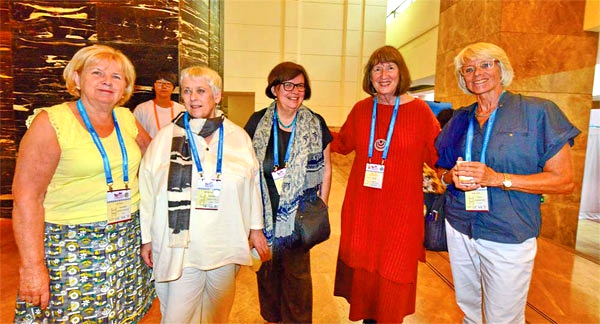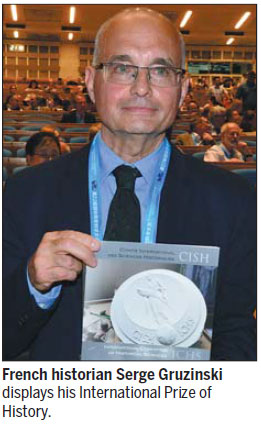
French historian Serge Gruzinski won the inaugural International Prize of History at the 22nd International Congress of Historical Sciences, which ends on Saturday, for his pioneering work on questions of global and transnational history.
He was presented with a Jaeger-LeCoultre Reverso watch and an ICHS Medal at the congress venue in Jinan, the capital of East China's Shandong province, on Wednesday.
"Currently, global history and transnational history represent the main trends in the historical sciences," Marjatta Hietala, president of the International Committee of Historical Sciences, said at the award ceremony. "Since we have to cross borders and learn about the cultures of others, Serge Gruzinski's publications tell us about the importance of understanding other cultures, religions and different types of behavior. The common specification for his books is interdisciplinarity."

Gruzinski, who was born in 1949, is a specialist on the history of Latin America in the 16th, 17th and 18th centuries. He is an invited professor at Princeton University and a senior professor at the National Center of Scientific Research and School of Advanced Studies of Social Sciences.
"It is global history itself that restores the historic landscape to its thickness, complexity, diversity and ambiguity, which have too often been erased by Western history or national history for centuries. Can we still examine the European Renaissance without the countries of Islam, without China, India or Japan? How should we think about the New World paying no attention to these major actors in the 16th century world?" Gruzinski said.
"A few years ago, I tried to reread the conquest of Mexico in the light of the Ming Dynasty (1368-1644) of China in a book titled The Eagle and the Dragon. Hence, I realized that we could not write a line of history, even the history of the Americas, without having in mind the past of this great country and the scope - very often abysmal - of our ignorance."
French historian takes away inaugural 'Prize of History'
Laurent Tissot, treasurer of the ICHS, said Gruzinski was one of the first to demonstrate how history is neither unilateral nor uniform.
"Serge Gruzinski doesn't want to simply de-Westernize history, neither does he want to remove the ways of thinking that make it so simplistic and so obvious to our Western eyes. He wants to globalize history.
"If the world is to be taken globally, the approach has to be global too. The question is to examine the way its parts get into mutual contact, how they are brought to meet, to face, to appreciate or to hate each other and to mix. The approach Serge Gruzinski develops is not easy," Tissot said.
The International Prize of History honors a historian or historians who distinguish themselves in the field by their works, publications or teaching, and who significantly contributed to the development of historical knowledge, on a smaller scale but comparable in a way to the Nobel Prize or the Field prize in Mathematics, Hietala said.
"Only the collective members of the ICHS - its national committees or the international affiliated organizations - could propose candidates. No individual applications were accepted. The prize is nominally awarded and cannot be posthumously awarded. Exceptionally, the prize may be awarded jointly to two, or three people at most," she said.
"The Jinan congress is the first time we are awarding the prize. The jury - the board of the ICHS, which has 12 members from different countries - experienced many difficulties in choosing the best historian from among the many highly qualified candidates proposed," Hietala said.
"The prize will encourage historians to conduct intensive research, especially in the field of global history. Currently, most Chinese historians are more concerned with research on Chinese history," said Wan Ming, an expert on the history of the Ming Dynasty at the Chinese Academy of Social Sciences.
Source:China Daily